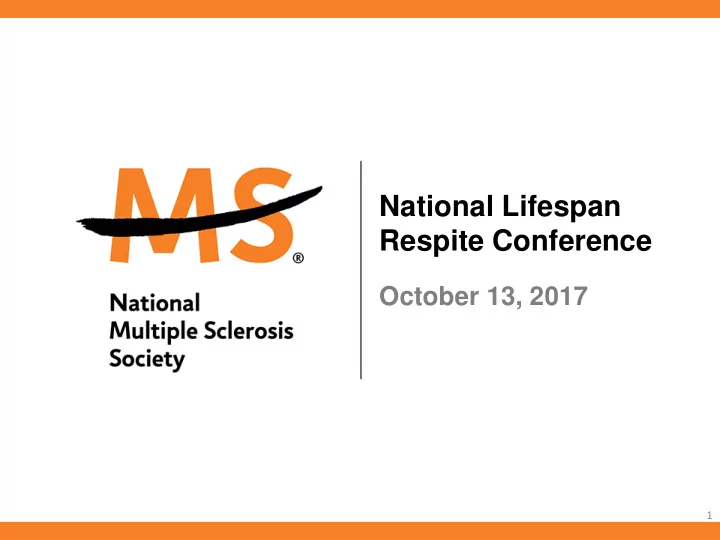

National Lifespan Respite Conference October 13, 2017 1
Agenda • About the Society & Multiple Sclerosis • Society’s Advocacy • Caregiving Legislation • Affordable Care Act & Medicaid Threats 2
About the Society The Society mobilizes people and resources so that everyone affected by multiple sclerosis can live their best lives as we stop MS in its tracks, restore what has been lost and end MS forever. Last year alone, through our comprehensive nationwide network of services, the Society devoted more than $100 million to connect approximately one million people affected by MS to the connections, information and resources they need. To move closer to a world free of MS, the Society also invested $42 million to support more than 380 new and ongoing research projects around the world. 3
About Multiple Sclerosis (MS) • Unpredictable, often disabling disease of the central nervous system • Immune system attacks myelin; this disrupts nerve impulses to and from the brain & spinal cord • Symptoms vary person-to-person • Symptoms include numbness, paralysis, balance problems, fatigue, pain, depression, vision problems • Usually diagnosed between ages of 20 and 50 • 15 approved Disease-Modifying Therapies & symptom management drugs 4
Society’s Advocacy Improves Day-to-Day Lives • Affordable, quality health coverage • Access to medications • Long-term services and supports including caregiver support • Home modification tax credits • Disability rights Research • Research funding • MS prevalence & population data • Regulatory engagement • Regenerative medicine • Value 5
Society’s Advocacy • Robust advocacy staff in D.C. and around the country • Work in coalition at the state and national levels • National coalitions include: 6
Society’s Advocacy 7
Caregiving Legislation RAISE Family Caregivers Act • Would require a comprehensive family caregiving strategy to be developed and implemented • Sens. Collins & Baldwin (S. 1028); Reps. Harper & Castor (H.R. 3759) • Passed Senate on Sept. 26; awaiting House action Credit for Caring Act • Tax credit up to $3,000 to support long-term care needs (e.g., assistive technology, home modifications) and caregiver supports (e.g., respite care, counseling & training, lost wages) • Sens. Ernst & Bennet (S. 1151); Reps. Reed & Sanchez (H.R. 2505) 8
Affordable Care Act & Medicaid Threats • Affordable Care Act repeal/replace bills have included proposals to fundamentally change Medicaid’s structure, eligibility and services • Budget- & philosophy- driven 9
Block Grants & Per Capita Caps Medicaid is currently an entitlement program. • Federal match for any money spent on a Medicaid beneficiary. • Based on need. Under a block grant or per capita cap: • States would receive a fixed sum of federal money based on a formula. • Once the federal money is spent, burden falls to the state. 10
Why Block Grants & Caps are Dangerous • Cost shift to states • States would cut populations and/or services, especially optional services. Mandatory Services Optional Services Physician services Prescription drugs Lab & x-ray Physical, occupational & other rehab services Inpatient & outpatient hospital Case management Rural health clinic services Personal care services Nursing home services Home- and community-based services 11
Why Block Grants & Caps are Dangerous • People with disabilities are a high cost population, so impact on them would be disproportionate. • Proposed growth rates inadequate • Stifles innovation • Once Medicaid’s structure is changed so drastically, nearly impossible to change back. 12
Other Proposals • Cut or eliminate the Community First Choice option • Phase out Medicaid expansion • Ability to opt out of Essential Health Benefits; impact on Annual & Lifetime Caps 13
Affordable Care Act Repeal/Replace Bills • Per capita caps House American • $834 B/10 years less federal $$ (all Medicaid changes) Health Care Act • 14 M fewer covered/10 years Senate Better • Per capita caps or block grants Care • $756 B/10 years less federal $$ (all Medicaid changes) Reconciliation • 15 M fewer covered/10 years Act • Per capita caps Senate Graham- • $53-175 B by 2026; then, steeper cuts--$1.1-3.2 Cassidy Bill T by 2036 14
Fiscal Year 2018 Budget Resolution • 2017 Budget Resolution had “reconciliation” instructions to repeal the Affordable Care Act and achieve a certain amount of savings • Reconciliation allows Senate passage with only 51 votes • Currently working on 2018 Budget Resolution • Senate’s 2018 Budget Resolution is largely focused on tax reform, but includes reconciliation instructions on health care specific to the Finance Committee 15
Connect with Us Website www.nationalMSsociety.org MS Navigators/Call 1-800-344-4867 Center www.facebook.com/nationalmssociety/ @MSsociety @MSactivist Sign up to get our MS www.nationalmssociety/MSActivist Advocacy e-newsletter & action alerts 16
My Contact Information Laura Weidner Senior Director, Federal Government Relations laura.weidner@nmss.org 202-408-1500 17
Recommend
More recommend